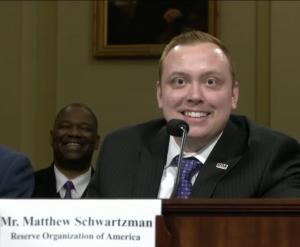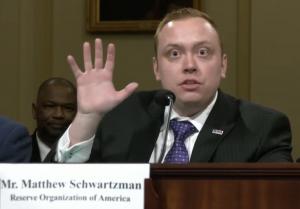
ROA urges Congress to drive forward with needed reforms to improve military to civilian transitions

ROA’s legislation and military policy director Matthew Schwartzman (front right) and director of operations Trey Criner (back left) share a moment of levity with the members of the economic opportunity subcommittee. Source: Screenshot of hearing video feed.
On March 20, ROA testified before Congress on ways to improve military to civilian transitions for reserve component service members and their families.
WASHINGTON, D.C., UNITED STATES OF AMERICA, March 25, 2024 /EINPresswire.com/ -- The Reserve Organization of America, the only national military organization that solely and exclusively supports the Reserve and National Guard (referred to as the reserve components), testified March 20 before Congress on pending legislation and ways to improve military to civilian transitions for reserve component service members and their families.
Read ROA’s written statement for the record here.
At the hearing, held by the House veterans affairs economic opportunity subcommittee, ROA reaffirmed its support for legislation that requires all courses under the Montgomery GI Bill Selected Reserve to be charged at the in-state tuition rate (regardless of the Selected Reserve members state of residence) and improves homeownership opportunities for citizen-warriors and their families.
ROA was also asked to present its recommendations for improving the Transition Assistance Program, which unfortunately fails to meet the unique needs of reserve component members and their families.
“To resolve the current TAP dilemma, which is caused by its one size two components construct, ROA proposes a five-step action plan, which we refer to as the Delivering Reservists Integration and Veterans Education plan, also known as the DRIVE plan,” said ROA’s legislation and military policy director Matthew Schwartzman at the hearing. “ROA’s DRIVE plan, if adopted by Congress, would drive forward much needed reforms by increasing access to component-focused counseling and resources while simultaneously providing reserve affiliated participants with additional flexibilities in navigating their respective TAP track.”
More specifically, ROA’s DRIVE plan calls on Congress to:
1. Amend TAP’s eligibility requirements to allow service members who accumulate 180 cumulative days of active service, which includes drill weekends and active duty for training, to participate.
2. Provide reserve component members that take TAP multiple times with diminishing returns the opportunity to opt out of their TAP requirements (with thoughtful consideration given to the timing of such a request).
3. Add reserve component focused matters to the TAP preseparation checklist and process, including information, advice, and counsel on using separation from service documentation to receive retirement benefits.
4. Establish a reserve component curriculum track within TAP.
5. Ensure military spouses are fully integrated in their service spouse’s TAP process.
While traction is gaining on ROA’s DRIVE plan and the need to adequately address TAP’s core issues, what remains unclear is how Congress will proceed jurisdictionally.
Because certain elements of TAP fall under Title 10 of the U.S. Code, the armed services committees technically have legislative jurisdiction over this matter. However, that jurisdiction may be shifted to the veterans affairs committee, which (normally) focuses on Title 38 issues.
When asked if ROA would support this change, Schwartzman replied: “So long as that was in accordance with the Constitution, so long as that was in accordance with the standing rules and parliamentary procedure of the House, and so long as that would lead to a more expedient passage of the proposals we’re asking for, then yes. We would support that. But we’ll work with anyone.”
Following the hearing, ROA detailed its next steps in an Up to the Minute Man Update with director of operations Trey Criner and defense fellow Jake Fales:
“What comes next? We would like to hear from you,” said Criner, a retired Navy commander. “We would like to hear from our reservists and their families. Bring us your stories so we can ensure your voice is captured on the Hill.”
To share your story and have your say with ROA’s TAP campaign, please contact Trey at tcriner@roa.org.
Fales, ROA’s defense fellow (legislative intern), described his experience at the hearing:
“I had a great experience learning and getting to hear from all the wonderful panelists,” said Fales. “Seeing the legislative process in action up close and personal provided me with an even stronger sense of patriotism and purpose. I look forward to what comes next for ROA.”
Hearings are not to be taken lightly, as they provide congressional members and industry stakeholders with an opportunity to publicly exchange viewpoints on issues and bills. However, a legislative hearing is only one step of the process.
As such, ROA’s commitment to improving military to civilian transitions for Reserve and National Guard service members and their families will continue to drive forward.
Matthew Schwartzman
Reserve Organization of America
mschwartzman@roa.org
Visit us on social media:
Facebook
Twitter
LinkedIn
Instagram
YouTube
ROA's Matthew Schwartzman delivers his opening remarks at the March 20 hearing held by the House veterans affairs economic opportunity subcommittee.
EIN Presswire does not exercise editorial control over third-party content provided, uploaded, published, or distributed by users of EIN Presswire. We are a distributor, not a publisher, of 3rd party content. Such content may contain the views, opinions, statements, offers, and other material of the respective users, suppliers, participants, or authors.



